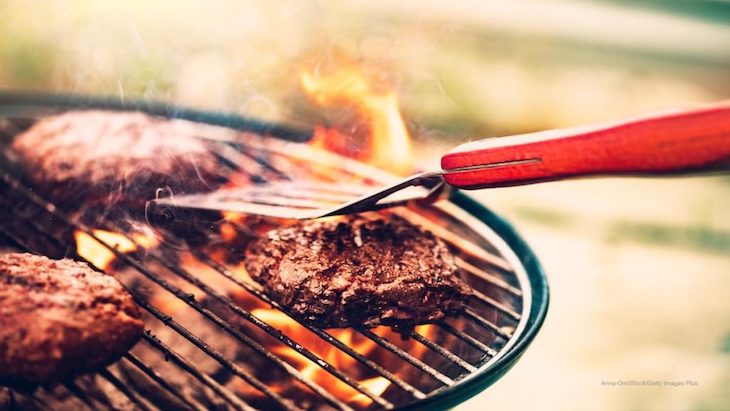Celebrate the Fourth of July this year without foodborne illness, with tips from the USDA about safe grilling. There are inherent risks that come with cooking in hot weather too.

First, always wash your hands before cooking and handling and serving food. Handle raw meat with care, since it can be contaminated with pathogen bacteria such as E. coli, Salmonella, Listeria monocytogenes, and Campylobacter. Keep raw meats away from foods that are eaten uncooked such as raw fruits and vegetables.
When you form hamburgers or season steaks, using a separate cutting board and plate. And wash your hands thoroughly with soap and water after touching uncooked meat and poultry. If you marinate the meat or poultry, keep the used marinade away from other foods, and discard it when you put the food on the grill. If you want to serve the marinade, it must be boiled for three minutes to kill any pathogens.
To get your grill ready, preheat it and scrub the grate with a long handled brush once it’s hot, making sure that any food remnants from the last grilling session are scraped off. Then remove the meat, poultry, or seafood from the container or platter and put it on the grill, keeping some space between each piece.
Always cook these foods to a safe final internal temperature. For whole cuts of beef, pork, and lamb such as steaks and chops, the minimum temperature is 145°F with a three minute rest time. Ground beef, pork, and veal should be cooked to 160°F. Whole poultry, including breasts and legs, must be cooked to 165°F, as should all ground poultry. And fish, whether whole or cut into filets, must reach 145°F. Hot dogs should be cooked to a minimum of 140°F; beef and pork sausages to 160°F, and chicken and turkey sausages to 165°F.
You can’t tell by looking at meats or poultry, or by touching them, if they are done and safe to eat. You must use a reliable and accurate food thermometer; a digital model is beat. Insert the probe into the thickest part of the meat and poultry, putting it into the side of burgers and thin fillets, for the most accurate reading.
Always use a clean plate or platter to hold the cooked food when it comes off the grill. Never reuse the plate that held the uncooked food, or you will risk contaminating it.
And don’t forget that all leftovers must e discarded or refrigerated within two hours of coming off the grill or out of the fridge. When the ambient air temperature is above 90°F, that time shrinks to one hour.




